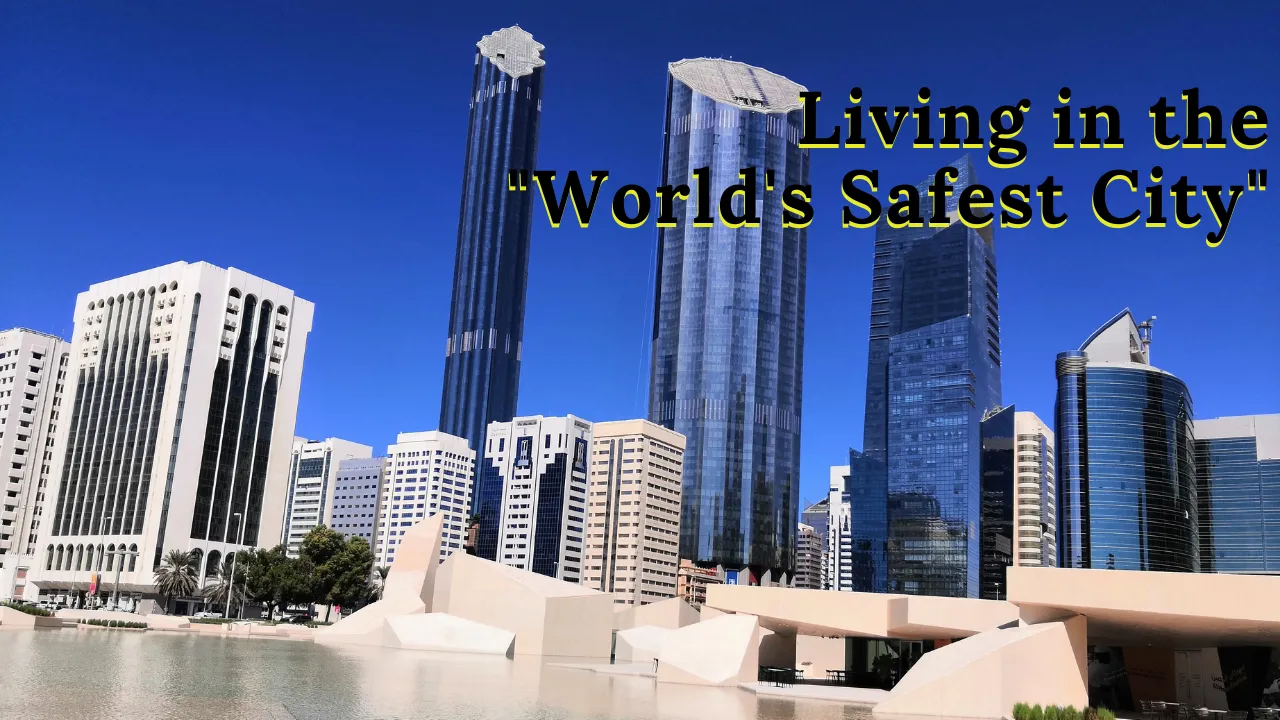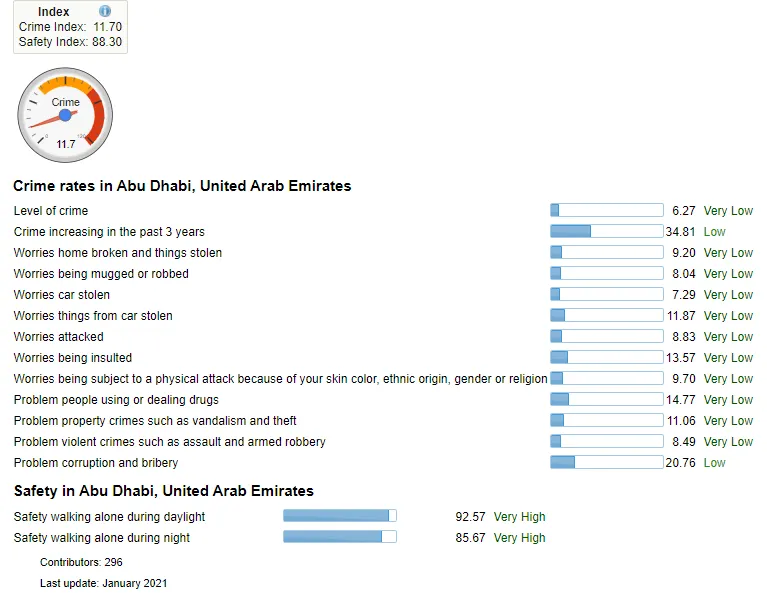
World's Safest City
The other day, news came about that Abu Dhabi, our city of residence and the Capital City of the United Arab Emirates, was named the World's Safest City. This is based on the data from Numbeo, a leading database for living indices in the world.
Abu Dhabi came in at the top with a crime index of 11.70 percent [1], topping the list consecutively since 2017.[2] In all honestly, as an expat here for almost 16 years, I can really say that it feels safe here. You can walk alone without fear even at night, you do not have to worry even if you leave your belongings aside, you can park your luxury sports car in public parking overnight and you will still find it unscathed the following day.
I remember one time when my father was here, I left my car's engine on while we went back inside the house to pick up some stuff. He worriedly asked me if it was okay, and if nothing will be taken from my car or worse could my car be taken way? I assured him, no one will even have a second look at my car. LOL
To give you a picture, let me share screenshot of the the stats as of January 2021.

Having said the above, it is still preposterous not to stay vigilant and be oblivious of what is happening around. Bad things can still happen and we must not be caught off guard.
How's the cost of living though?
I will try to share from a point of view of an average Asian expatriate. As expats, we mostly only rely on our monthly salary to survive. Based on experience, you will more likely to be paid depending on the passport/nationality you hold. Meaning, even if the companies won't admit, they have different payscales for Asians, Europeans, and Arabs.
An Asian office manager, for example, can be paid AED 10,000 to 15,000 ($2,717 - $4,076), while Arabs can be paid AED 20,000 ($5,400) and Europeans/other Western expats can get AED 30,000 ($8,150) per month. That's on average, and of course depending on the industry.
An average Asian worker can get as low as AED 1,500 per month salary. Some of them, however, can have free accommodation and transportation from their employers and they make do of their salary for their other living expenses like food and other essentials.
Accommodation
If there's something that's on a bullish pattern from the very beginning, no bears even during the great recession of 2007, that's the rent. Rent is the biggest killer, I would say.

Hence for most bachelors, they opt to find shared accommodations. The conditions can be very bad where as many as 10-12 people can share a room and the same bathroom. Shared rental can cost from AED 1,000 to 1,500 depending on how many you are in the room and whether you occupy the top or lower bunk of the bed.
If you opt to rent your own apartment, then you would have to pay extra for W&E and internet.

Transportation
Transportation here varies - public bus transport is only AED 2 ($0.54) per ride that you have to load into a bus card (minimum AED 10 / $2.71) per recharge or get a monthly pass for AED 80 /$21.74. It is relatively cheap but then it can be uncomfortable especially during the summer months when the weather is extremely hot and humid.
The taxi flagdown rate is AED 12 ($3.26) and then AED 1 per kilometer. It's a far cry from flagdown of AED 1.50 ($0.40) way back 2005 when I first came. There were no buses that time, and we took the taxi to almost everywhere we went. I remember one of the factors that we considered when looking for a job before was the location - if the taxi fare would exceed AED 5 ($1.36) one-way, we likely did not attend the interview. AED 5 used to be expensive for a taxi ride. LOL.
For some, getting their own car is the way to go especially for the likes of us with children. Car for us is a necessity. Some people would go beyond and get themselves high-end, luxury cars, but for me personally, I find that way too much. Hence a Toyota Corolla sedan is more than enough for us. City driving for 6 years, my car's mileage is only 75k. It's proven to be economic in terms of petrol where my full tank is only AED 80 ($21.74) that can transport me already for 2 weeks. Parking, however, is expensive at AED 15 ($4) per day or AED 375 ($102) per month (Fridays and holidays are free).
Market/Grocery
We're a family of 5, and I allocate AED 1,500 ($407) per month on food and other essentials.

Grocery shopping had also significantly changed over the years. There used to be a time when AED 100 ($27.17) can fill up a big shopping cart. Now, you can literally just buy a tray of eggs, oil, bread, and perhaps some bunch of herbs with the same amount.
Children's Education
Since this country/city is "family friendly", a lot of expats have also opted to bring their children here. A normal Filipino school would cost from AED 15,000 ($4,076) on tuition exclusive of other fees per student. While should you want to send them to British or American schools, for example, then that would have to be triple or quadruple the cost.
Conclusion
I did not dare put recreation figures anymore, mainly because we do not indulge a lot in such. We mostly take advantage of free recreational activities, and actually, there are a lot.
Based on Numbeo, here's a summary of the cost of living in Abu Dhabi as of January 2021.
Summary about cost of living in Abu Dhabi, United Arab Emirates:
Family of four estimated monthly costs are 10,604.66AED without rent (using our estimator).
A single person estimated monthly costs are 3,060.19AED without rent.
Cost of living index in Abu Dhabi is 9.27% lower than in Dubai.
Rent in Abu Dhabi is, on average, 13.84% lower than in Dubai.
Please do note, dirham is pegged to the US Dollar, USD 1 : AED 3.68.
Living here is in many ways expensive than in other cities hence we have to be prudent with our choices and do not forget that we are expatriates whose stay here are overly dependent on job opportunities. One day, whether we like it or not, we have to go back to our own country. That is why saving and preparing for that time of settling back is really very important.
How about you how is the cost of living in your country?
[1] Current Crime Index, Numbeo
[2] Crime Index by City 2021, Numbeo



